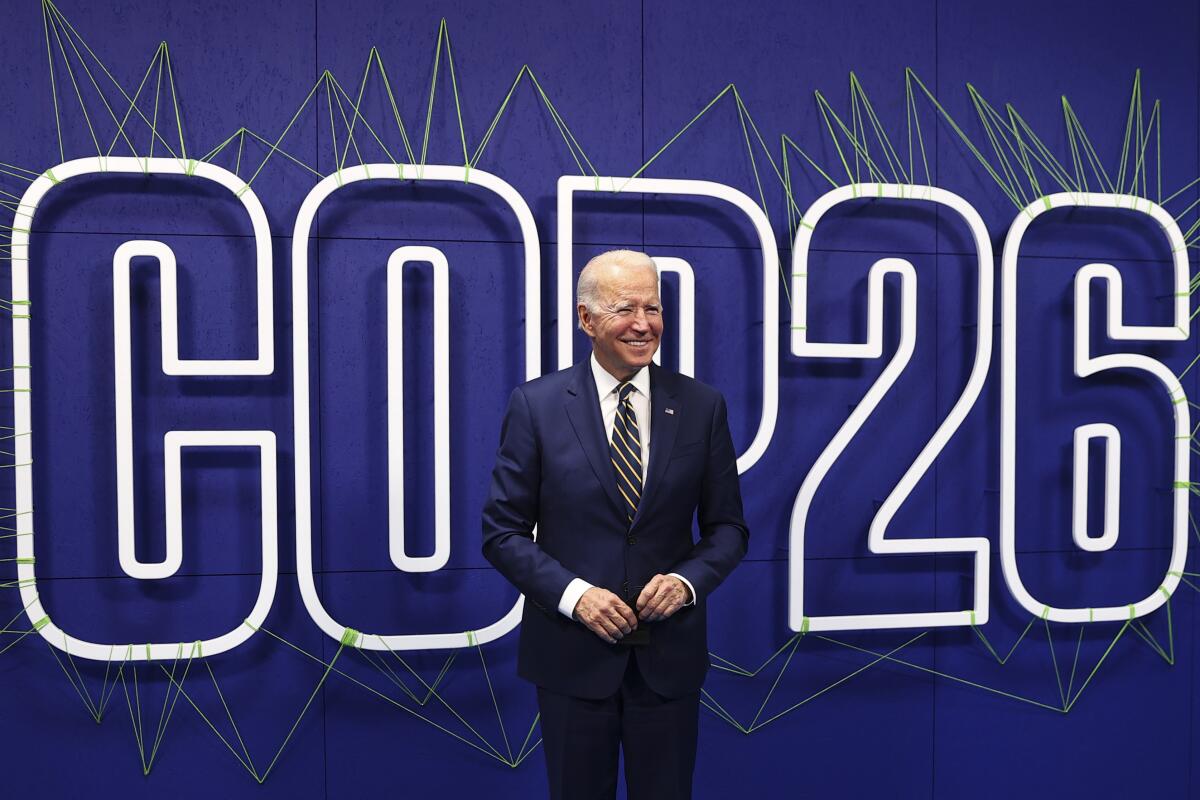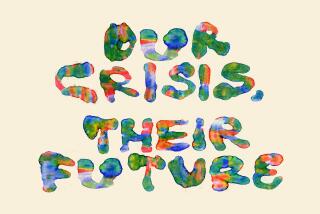Letters to the Editor: In Glasgow, sacrifice a few GDP points to save us from climate change

- Share via
So the editor: Climate change presents many challenges. What will it cost and who will pay? What are the “unknown unknowns”? (“On the climate crisis, delay has become the new form of denial,” Opinion, Oct. 31)
The consequences of doing too much or too little are extremely asymmetric. Do too little, and our grandkids inherit a hot, dystopian planet. Do too much, and we spend a bit more than absolutely necessary but end up with cleaner air and water.
We also prevent millions of pollution-related deaths. We save billions of dollars on healthcare and lost work days. We create millions of new jobs that cannot be shipped overseas. We prevent oil-exporting nations from making us economic hostages, and we stabilize the global energy economy.
Markets rebound; our planet may not. We have a choice. Personally, I’ll risk 1 or 2 GDP percentage points as insurance against doing too little on climate change.
Tom Hazelleaf, Seal Beach
..
To the editor: I always seek out your articles on global warming, so I read climate scientist Michael Mann’s op-ed article as soon as it was published. His ideas have been expressed many times, and yet we continually avoid their truth.
Life on earth is critically wounded under battlefield conditions. We are trying to fix a severed artery with a Band-Aid, while our wounded world is bleeding out.
Doctors tell us, “We need better Band-Aids.” Administrators argue, “Band-Aids are too expensive.” A resident at the back says, “Maybe we need a tourniquet, even if we have to amputate later.”
We must move beyond empty words to help our world heal. That is our only chance to save ourselves.
Patty Donnelly, Chino Hills
..
To the editor: When you’re in a hole, stop digging. To fight climate change, we must reduce our carbon emissions. Yes, we will have to adapt to the damage being done by the carbon we have already emitted, but the cheapest way to capture and sequester carbon is to leave it in the ground.
Transitioning to renewable energy will be expensive and disruptive. Not transitioning, or taking half-measures, will be much more expensive.
I disagree with Mann on one point: Much of climate change is an engineering problem, which can be solved with technologies already in use or in development. Renewables are cheaper than dirty power. Electric cars are cheaper to operate. Battery technology is progressing rapidly.
What’s missing is the will to ignore the entrenched interests, not the technology. Tell your elected representatives to eliminate subsidies, price carbon and put dirty and renewable power on an equal basis.
Sanford Krasner, Altadena
..
To the editor: The United Nations is not the “last, best hope” to stave off catastrophe, as U.S. climate change envoy John Kerry said. We are, and putting that job on the U.N.’s shoulders denies our responsibility.
Unfortunately, our democracy is in shambles. One of our major parties does not believe in democracy.
The United States is still the world’s leader, but we’ve led the world to inaction on climate change. While every Congress and every president since Lyndon Johnson have been informed and warned about climate change, they’ve worked to empower the fossil fuel industry.
President Biden’s plan will not change things at the U.N. climate summit in Glasgow, Scotland. It’s window dressing compared with what needs to be done.
Kerry and the world know that America needs to tax carbon pollution and to enforce it globally with a tariff at our border.
Kaye Preston, Oceanside
More to Read
Toward a more sustainable California
Get Boiling Point, our newsletter exploring climate change, energy and the environment, and become part of the conversation — and the solution.
You may occasionally receive promotional content from the Los Angeles Times.









